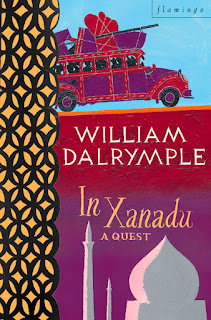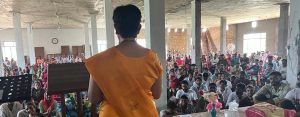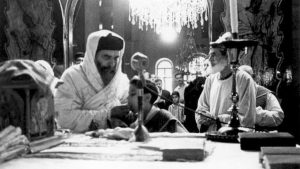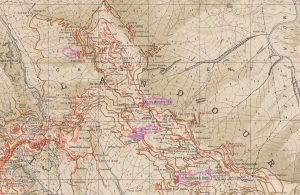I love the way Ephesians opens: “in Ephesus … in Christ Jesus” (1.1). Chapters 1-3 focuses on the ‘in Christ Jesus’, while chapters 4-6 leans across to the ‘in Ephesus’. It is the double identity of the believer—and it makes for some fun sermon series, like “In Invercargill, in Christ” and “In Kyrgyzstan, In Christ” (both of which I have tried!).
The idea also makes for some fun holidays. This past week I travelled, in my imagination, through William Dalrymple’s In Xanadu: A Quest while travelling, in my real life, around the lakes east of Rotorua, in Aotearoa-New Zealand.
This is Dalrymple’s first book, written as a 22 year old on his summer break from Cambridge University. He retraces the steps of Marco Polo, travelling with a phial of oil from the Church of the Holy Sepulchre, in Jerusalem, all the way to Xanadu, the summer palace of Kublai Khan. Dalrymple has gradually become more serious, as he transitioned from being a travel writer to an historian but, as with City of Djinns, this book was written during his halcyon days of fun.
We used the online ‘bookabach’ service to find a small caravan fixed to a site on the shores of Lake Rotoiti. Our elderly hosts turned out to be Christians with a heart for mission here, there and everywhere. Whether it be fostering troubled children, or working for transformation in a village in Thailand, they have a story to tell. I kept urging them to write it down so that others can hear what God can do through ‘normal people’, as they put it. Here is our caravan, barely visible behind the agapanthus…
Maps
Dalrymple’s journey was epic, back when epic meant epic. For starters, it involved travelling through the Ayatollah’s Iran and through China without the required documentation. Madness!
Jerusalem. Acre. Latakia. Aleppo. Ayas. Sivas. Tabriz. Osku. Sultaniya. Saveh. In 1986 it was not possible to travel through Afghanistan, so the detour was to the south, through Pakistan. Zahedan. Quetta. Lahore. Karakoram Highway (open briefly in 1986, which was what enabled the trip to take place). Pir Sar. Chini Bagh/Kashgar. Khotan. Keriya. Peking. Xanadu/Shang-tu.
As you can imagine, there were lots of visits to Google Maps and Wikipedia along the way.
I got out the maps and drew a black line between Jerusalem and Acre. It was about a quarter of an inch long. Lahore was three feet away at the edge of the map. Peking lay halfway across the room on an entirely different sheet. It seemed a very long way indeed (26).
Our journeys were somewhat less than epic, but I did create a map just in case someone is interested, nine centuries from now. We did a few walks like the Rotomā Bridle Track, Hongi’s Track, Okere Falls Track and Ngahopua Track (our favourite). Freshly outfitted in my floral blue rash shirt, together with matching blue shorts, I even had a few swims—but it was more blue balloon, than Blue Lagoon.
Stories and Photos
Dalrymple can tell a story.
Sultaniya, not too far from Tabriz, is one that stands out. It is ‘now a deserted, crumbling spread of ruins, but (was) once the capital of Mongol Persia. From it was ruled an empire which spread from the Oxus to the Euphrates’ (128). ‘The whole city disappeared. Only the vast mausoleum of Uljetu (the ruler) remained’ (130). Dalrymple finds it and, with his love for Islamic architecture, is enamoured with it. ‘Every idea in the Taj was fully expressed here … the Taj is simply a refinement of Sultaniya’ (130). That is a big call!
Another is when he discovers that the breakdown of their vehicle, in the Himalayas on the way to China, deposited them near Pir Sar, reputed to be the furthest eastern point in the travels of Alexander the Great— and so off he goes exploring, as twilight approaches. Or, what about Madam Curd terrorizing him in Kashgar, or watching a James Bond movie with Salindi in the same city? What about corroborating the story of the Three Wise Men by delving into Zoroastrian traditions around astronomers/magi in Saveh? Amazing.
It goes on and on.
On arrival in Quetta, after noticing ‘swarms of yellow autorickshaws squealing like kicked pigs’ (168), he writes this as we wanders around the bazaars:
It was a typical, busy, noisy, dirty, stinking, bustling, loud, hot town in North India. It was like a homecoming—a sight which I knew well, and loved (168).
That one did not take too much imagination. Thoses are the very same sights (and smells and sounds) that “I knew well, and loved” in North India as well.
Meanwhile, back in Rotoiti, photos and vistas replaced stories and imagination…
Appreciation
There is so much to appreciate with Dalrymple’s books. Many years ago I started with City of Djinns, which introduces the reader to Delhi in the most humorous manner. The humour is evident here as well. Much of it emerges in dialogue with the people he trusts and befriends along the way: Hamoudi in Acre; Krikor in Aleppo; Tadios in Tabriz; Kevser in Sivas; Reza, the policeman in Saveh; Joe, Ramesh, Nazir on the ride to Quetta; Salindi in Kashgar …
On a visit to a nightclub in Aleppo with Krikor, he writes this about the performer on the stage:
Her song, plainly a tragedy, combined all the drama of a Verdi aria with the earsplitting torture of loud feedback (54).
About Jerusalem, he writes:
For two thousand years Jerusalem has brought out the least attractive qualities in every race that has ever lived there … Sacred to three religions, the city has witnessed the worst intolerance and self-righteousness of all three of them (18).
There is also much to appreciate when walking in the New Zealand bush.
 1 1 |
| This one always captures me. Fragile plants growing out of fallen trees. It is everywhere in the bush—and it speaks of those who have gone before, on whose shoulders we stand and on whose legacy we build, under God’s hand. When I see this scene, it is an opportunity to express a gratitude to God for them. |
 |
| The most secure way to unfurl is in community with others doing the same. It takes a whole community to grow a disciple into maturity. |
Companions
One feature of Dalrymple’s journey is that he travels with two different women—Laura, whom he had never met, goes as far as Lahore with him and then Louisa, a former girlfriend, joins him in Lahore for the ongoing trip to Xanadu. As they prepare for the trip, this is what he writes:
Thus I committed myself to traveling across twelve thousand miles of extremely dangerous, inhospitable territory, much of which seemed still to be closed to foreigners, with two companions, one a complete stranger, the other completely estranged. Perhaps I should have consulted a doctor; instead I went to a travel agent and bought a ticket to Jerusalem (13-14).
My companion was Barby, one who is neither ‘stranger’ nor ‘estranged’. It has been an epic journey under God’s hand. We met before we can remember, in all likelihood in a church creche in the Himalayan foothills, and now, in this year of 2022, we will celebrate 40 years of marriage.
nice chatting
Paul
About Me

the art of unpacking
After a childhood in India, a theological training in the USA and a pastoral ministry in Southland (New Zealand), I spent twenty years in theological education in New Zealand — first at Laidlaw College and then at Carey Baptist College, where I served as principal. In 2009 I began working with Langham Partnership and since 2013 I have been the Programme Director (Langham Preaching). Through it all I've cherished the experience of the 'gracious hand of God upon me' and I've relished the opportunity to 'unpack', or exegete, all that I encounter in my walk through life with Jesus.
Recent Posts
Football helps me train preachers. See, when you speak to me about football—or, ‘footie’—I need to know where your feet are before I can understand what you mean. Are your feet in Ireland, or Brazil, or the USA, or NZ—or in crazy Australia? It must be the most fanatical sporting nation in the world. Within…
Having been born in 1959, I don’t remember much about the 1960s. But I have heard a lot. Hippies. Drugs. Rock ‘n Roll. Assassinations. Moon-walking. A quick trip across to ChatGPT informs me immediately that it was ‘a transformative decade across the world’—marked by the civil rights and feminist movements, Cold War tensions, consumerism and…





















Thank you for the glimpses of both worlds! I had a fantastic few days at Lake Rotoma, many years ago 🙂
Yes, Heather, I swam at the far end of Rotomā, just as the road heads away from the lakes. A very nice spot.
Hope you enjoyed the cricket :).
Paul